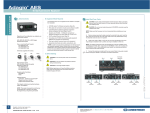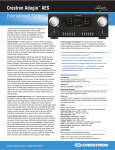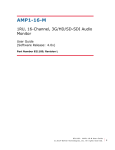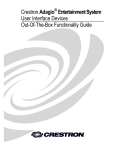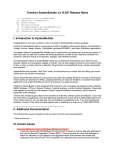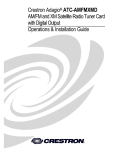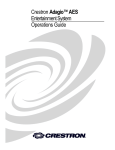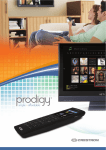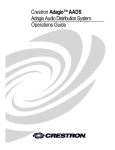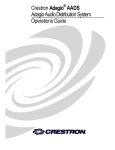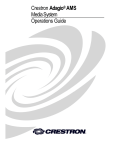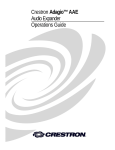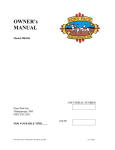Download Crestron Adagio ATC-AMFMSR Specifications
Transcript
® Adagio AMS 1 A.. Check Contents A B. Equipment/Tools Required Depending on the configuration you ordered, you should have received: AMS, AMS-XM, or AMSI Adagio Media System One or more Dual Radio Tuner(s) ATC-AMFM2 Tuner ATC-AMFMXM Tuner ATC-AMFMSR Tuner Antenna(s) supplied with tuner(s) ® FM AM XM • • Keypads and/or Controllers C2N-DBF12 APAD • Optional Devices CEN-IDOC Interface for Apple® iPod ® CEN-IDOC) Adagio Audio Server (AAS) Adagio Audio Expander (AAE) • • • ® NOTE: This system has specific out-of-the-box functionality that is outlined in this guide. No programming is required to get started! • CAT5/5E cables* for Ethernet connections (Step 3A) RCA cables for connection of audio sources (Steps 3C & 5 E and F) Wire lugs to attach the ground wires to the equipment. * In order to ensure optimum performance over the full range of your installation topology, Crestron Certified Wire, and only Crestron Certified Wire, may be used for Cresnet and CAT5 connections. Failure to do so may incur additional charges if support is required to identify performance deficiencies because of using improper wire. Cables for video sources (Step 2) ® Cresnet cable* for network connection of Crestron devices throughout the home (Steps 4 and 5) C. Before Starting Speaker wire (12 AWG max.) for connection of speakers throughout the home. (Steps 2, 4A - C, & 5A and B) Speaker wire (10 AWG max.) for connection of speakers in the home theater. (Step 2) DHCP-enabled Ethernet router (Step 3A) Grounding wire (16 AWG) For grounding audio equipment together and connection to earth ground. Appropriate hand tools (wire cutters, screwdrivers, etc.) ! CAUTION: Do not connect power cords until instructed to do so. ! CAUTION: Do not run speaker wire parallel to electrical wiring or Cresnet wiring. ! CAUTION: Do not bridge amplifier outputs. NOTE: Before beginning any of these QuickStart procedures, make certain that all speaker wires and Cresnet cables are installed throughout the home. Connections for Theater Configurations Default* 7.1 Theater + 4 Stereo Rooms SCREEN C FR SEATING SR SCREEN C FL S FR S HDMI FL COMPOSITE 1 • • S-VIDEO 1 COMPONENT 1 • Pr DISPLAY *Two common theater configurations are shown. Refer to the AMS Operations Guide for other possible configurations. Optional* 5.1 Theater + 5 Stereo Rooms SL Outputs BL FL SL C SEATING SL SR FL SL C FR SR S Left Right Room 2 Room 1 Left Right Right Right S + – – + – + – OR FL FR C SL SR BL From Room 5 From Rooms 1- 4 BR Left Right Speaker Level Outputs 1 For details, refer to the AMS Operations Guide, Doc. 6509. QUICKSTART DOC. 6510C (2015964) 07.13 www.crestron.com Specifications subject to change without notice 800.237.2041 201.767.3400 Right Room 3 Left AMS Right Room 4 Left BR BL BR FR SR S Room 5 Left Adagio AMS Speaker level wiring is shown. Use pre-amp connections if desired to connect to external amplifiers. The sub woofer can be connected to the RCA connector or the 3-position terminal block connector as desired. Use 12 AWG max. cables to the room speakers; use 10 AWG max. cables to the theater speakers. Connect theater AV sources and display to the appropriate connectors. Control of the display is accomplished using software tools. Refer to the AMS Operations Guide for details. Pb 2 • • Parts bag(s) containing connecting hardware, cables, and adapters Sirius • The following items are not supplied and are needed to complete the installation: AMS Operation Guide AMS QuickStart Guide (this guide) Operation Guide(s) for: ATC-AMFM2 Tuner ATC-AMFMXM Tuner ATC-AMFMSR Tuner Y quickstart guide Media System ® Adagio AMS quickstart guide Media System 3 Connect Optional Network and Audio Sources A. Connect the optional Adagio Audio Server (AAS) and CEN-IDOC to the AMS through a third party DHCP-enabled Ethernet router using CAT5/5E cables (not supplied). B. Connect the docking station (CEN-IDOC-DS) supplied with the optional CEN-IDOC to the port on the rear of the CEN-IDOC using the supplied cable. C. DHCP-Enabled Ethernet Router CEN-IDOC-DS AAS CEN-IDOC Connect the audio outputs of the CEN-IDOC and AAS to available AMS SOURCES connectors using RCA cables: • • AMS Connect the CEN-IDOC outputs to source 5. AAS Connect the AAS outputs to sources 7 - 10. NOTE: If the configuration includes an AAE, connect CEN-IDOC and AAS audio outputs to the AAE loop through SOURCES connectors, not to the AMS. Refer to Step 5. AMS CEN-IDOC 4 Connect Keypads, Controllers, and Speakers A. Connect the previously installed 16 AWG minimum (up to 12 AWG) speaker wire to the speakers in rooms 1 - 6. Observe the polarity of the wires to each speaker (black = –, red = +). Cresnet From Rooms 1- 6 NOTE: Use speakers that are rated for full available output. Do not connect more than two 8-Ohm speakers in parallel or one 4-Ohm speaker to each output. Rooms 5 - 6* Connect the speaker wire from rooms 1 - 4 to the AMS ROOMS connectors using the 2-pin socket connectors provided. C. Connect the speaker wire from rooms 5 or 6 to the AMS BACK connectors using the 2-pin socket connectors provided.* D. E. Right Left + AMS Connect the keypads (C2N-DBF12) and/or controllers (APAD) in rooms 1 - 6 to previously installed Cresnet cables. – Rooms 1-4 + APAD Controller OR – Connect the Cresnet cables from the rooms to the appropriate NET connectors on the AMS (e.g., Room 1 to Net 1, etc.). Typical wiring connections are shown below. –+ *Connection to rooms 5 and 6 depend on the configuration selected. For detailed information, refer to the AMS Operations Guide. From Rooms 5 - 6 Red White 2 Speaker Wire Blue Black For details, refer to the AMS Operations Guide, Doc. 6509. QUICKSTART DOC. 6510C (2015964) 07.13 – www.crestron.com Specifications subject to change without notice 800.237.2041 201.767.3400 Right + – APAD OR Controller From Rooms 1- 4 Right Left C2N C2N-DBF12 N-DBF12 Ke eypad Keypad OR C2N-DBF12 C2N N-DBF12 Ke eypad Keypad Adagio AMS B. ® Adagio AMS quickstart guide Media System 5 Connect o Grounds 7 C Connect the Optional Adagio Audio Expander (AAE) The following steps can be performed in any convenient order. Steps A through D are performed in the same way that similar connections were made to the AMS (Step 4), and are not illustrated again here. A. Connect previously installed 16 AWG minimum (up to 12 AWG) speaker wire to the speakers in rooms 7 - 12. Observe the polarity of the wires to each speaker. NOTE: Use speakers that are rated for full available output. Do not connect more than two 8-Ohm speakers in parallel to each output. B. C. Connect the speaker wire from rooms 7 - 12 to the AAE ROOMS connectors (Rooms 1 - 6) using the 2-pin socket connectors provided. D. Connect the Cresnet cables from rooms 7 - 12 to the appropriate NET connectors 1 - 6 on the AAE (e.g., Room 7 to NET 1, etc.). E. Connect the AMS NET and AAE NET LOOP THRU inputs using standard Cresnet cable. F. Connect the AMS theater downmix from the AMS OUTPUT connectors to the appropriate available AAE SOURCES connector (default is 6). NOTE: Specific connection to the AAE SOURCES connectors depends on the number and type of optional audio sources used in the system. Refer to Step 3 and to the AMS Operations Guide for details. G. Connect the keypads (C2N-DBF12) or controllers (APAD) in rooms 7 - 12 to previously installed Cresnet cables. Analog sources connect to the AAE SOURCES connectors; the sources are then shared with the AMS ANALOG SOURCES connectors through the AAE loop through inputs. The wiring method shown here is standard practice, but connections can be made to either side of the AAE connector set. Theater Downmix Using 16 AWG wire with ground lugs (not supplied), connect the ground terminals on the rear of the AMS and the optional AAE to a case screw on the rear of the optional AAS, and to an earth ground. Chassis grounds from external audio sources should also be connected to the AMS ground screw. AAS AAE AAE AMS Speakers From Rooms 7 - 12 Cresnet From Rooms 7 - 12 Cresnet AMS Earth Ground NOTE: If the Theater Downmix output is connected to an AAE SOURCES input, do not connect that loop through connection to the AMS. Theater Downmix 6 Install Dual Tuner Cards 8 ! CAUTION: Do not connect external sources to SOURCES connectors used by installed tuner cards. Slot 1 Remove screws securing the plate covering the card slot to be used. Insert the tuner card into the slot side rails, and make certain card is fully seated before using the attached screws to secure it in position. B. Install tuner cards in Slots 1 and 2 only, for out-of-the-box functionality. (One card may already be installed in Slot 1.) Either card may be installed in either slot. NOTE: The output of each dual tuner card occupies two of the ten available source connections in the AMS. Slot 1 outputs are on SOURCES 1 and 2, Slot 2 outputs are on SOURCES 3 and 4. After installing the tuner card(s), the remaining connections may be used for other audio sources. C. 3 ! CAUTION: If you are adding Crestron equipment beyond the devices mentioned in this guide, be aware that insufficient power can lead to unpredictable results or damage to the equipment. Please use the Crestron Power Calculator, available from the Crestron website (http://www.crestron.com), to help calculate how much power is needed for the system. AMS NOTE: Make sure that the power cord is not connected before installing any tuner cards. A. For Future Expansion Slot 2 NOTE: The AMS, AAS, and AAE units do not have a power switch. Power is applied to the units by plugging in their respective power cords. ATC-AMFM2 AM Antenna FM Antenna ATC-AMFMXM AM Antenna FM Antenna AM Antenna XM Antenna FM Antenna ATC-AMFMSR AM Antenna Sirius Antenna FM Antenna Connect the antennas included with the tuner cards. Refer to the guide included with the tuner(s) for details on connection and antenna placement. For details, refer to the AMS Operations Guide, Doc. 6509. QUICKSTART DOC. 6510C (2015964) 07.13 www.crestron.com Specifications subject to change without notice 800.237.2041 201.767.3400 A. Connect the AC power cord to the AMS and, if applicable, to the optional AAS and AAE. Then connect the power cord(s) to AC power. B. Connect power to all other system devices as required. (Cresnet supplies power to the APAD controller and the C2N-DBF12 keypads.) Adagio AMS ! CAUTION: Tuner cards are electrostatic-sensitive devices. Wear a grounding strap or touch the metal chassis of a known grounded device before handling and installing cards. Apply Power ® Adagio AMS quickstart guide Media System 9 Installer Tools Mode In Select Tuner Format A. A Verify that power to the AMS is on. After a few seconds, Loading . . . appears on the display. The unit then goes through an internal startup procedure that takes about one minute. B. When the display shows a tuner source, press and hold the SOURCE and ROOM buttons at the same time for about 10 seconds to enter the Installer Tools mode. This mode provides a series of menus and sub-menus, shown to the right, that let you perform a first time setup and basic configuration options. Do you want to install a CEN-IDOC in your system? Yes No Configure Theater Audio Configuration Subwoofer Front Center Speaker Inputs Restore Defaults System automatically populates this field with IP address of your AMS. Configure Network Configure Network Press the SETUP button on the CEN-IDOC Configure Network Enter nnn.nnn.nnn.nnn and IPID 03 on Crestron Network Setup Screen OK Abort Do you want to install an AAS 1/2/4 in your system? Yes No Audio Configuration 7.1 Theater + 4 Stereo Roo 6.1 Theater + 4 Stereo Roo 6.1 Theater + 4 Stereo and 6.1 Theater + 5 Stereo Roo 5.1 Theater + 4 Stereo Roo 5.1 Theater + 5 Stereo Roo Subwoofer Front Center Speaker Configure Input Select Audio Source Disabled Enabled Disabled Enabled Inputs 1: Movies 2: TV 3: DVD Audio: Video: Name: Audio: Video: Name: Installer Tools Select Tuner Format Configure Network Configure Theater Configure Distributed Audio Identify Keypads Load APADs About SURRND THEATER DISPLAY MORE SOURCE ROOM HOUSE MENU Configure Network Refer to the respective ATC Operations and Installation Guide for information on the differences in radio station tuner format for each selection. Use soft buttons to make selections. Follow screen instructions to configure. 1. Perform the functions in the order listed in the menu. 2. Use the Selection Knob to underscore each function and press the Enter button to select it. 3. Follow the on-screen instructions for each function. 4. Press the Enter button to select an on-screen choice. 5. Use soft buttons to select choices at the bottom of a menu screen. 6. The MENU button always takes you back to the Installer Tools menu. 7. When all Installer Tools mode functions are completed, use the MENU button to exit to Source mode. Advanced setup information and operational details are given in the AMS Operations Guide. North American European Restore Defaults Distributed Audio Set number of AMS Rooms Set number of AAE Rooms Name AMS Rooms Name AAE Rooms Set AAE Theater Source Name Sources Hide Sources Configure Keypads Restore Defaults Refer to the AMS Operations Guide for default values. All Theater sources and audio settings will be reset. Continue? Yes No Audio: Video: Name: Select the number of rooms that you will be using on the AMS 4 Select the number of rooms that you will be using on the AAE Yes AAS-4 Configured Assign to default Theater Inputs? No Press Yes to accept the default source assignments or press No to skip the assignment. A source assignment can be chosen while configuring the theater. Refer to the AMS Operations Guide for details. Select audio from the 10 analog, 6 digital coax, 4 digital optical, 1 multichannel and 3 HDMI sources, or [Not Used] for video-only sources; press the Enter button to select each choice. Press the Done soft button when you have finished making selections. Select video from the 8 component, 4 S-video, 4 composite, and 3 HDMI sources, or [Not Used] for audio-only sources; press the Enter button to select each choice. Press the Done soft button when you have finished making selections. Use the Selection Knob to identify the number of rooms for the AMS (1-4) and the AAE (0-6) in this system; press the Enter button to enter the value. 6 Soft Buttons AMS Selection Knob Name AMS Rooms Volume Knob 1: AMS Rm 1 2: AMS Rm 2 3: AMS Rm 3 Press the Edit soft button to change the Room names for easier identification. You can Select AMS Room 1 Na also use the Selection Knob 1: Room 1 2: Room 2 to scroll through the list of 3: Room 3 default names. Del < > Done Refer to the AMS Operations Guide for details. Edit Enter Button Mute Button Theater Off Button Room All Buttons Off Media Buttons Name AAE Rooms 1: AAE Rm 1 2: AAE Rm 2 3: AAE Rm 3 Edit Set AAE Theater Source Select the input to use for the theater down-mix input on the AAE 6 4 For details, refer to the AMS Operations Guide, Doc. 6509. QUICKSTART DOC. 6510C (2015964) 07.13 www.crestron.com Specifications subject to change without notice 800.237.2041 201.767.3400 Press the Del soft button to delete the current name. Use the Selection Knob to scroll through the letters; press the Enter button to select each choice. Use the < and > soft buttons to move the cursor left and right. Press the Done soft button when the name is finished. Repeat for each room name. Adagio AMS Refer to Page 5 Select Video Source Number Of AMS Rooms Number Of AAE Rooms Refer to Page 5 Done Configure Network ® Adagio AMS quickstart guide Media System 9 IInstaller ns Tools Mode (Continued) 10 A After the Installer Tools mode functions are finished, press a ROOM button, then press the Source soft button and use the Selection Knob to select available audio and video sources. Adjust the Volume Knob as necessary; press the MORE button to adjust the tone controls, and verify basic operation of your Adagio Media System. Refer to Page 4 Distributed Audio Set number of AMS Rooms Set number of AAE Rooms Name AMS Rooms Name AAE Rooms Set AAE Theater Source Name Sources Hide Sources Configure Keypads Restore Defaults Select Source to Name 1: Source 1 2: Source 2 3: Source 3 Select Source to Name 1: [Custom Name] 2: Source 2 3: Source 3 Edit Edit Press Enter or the Edit soft button to change source names for easier identification. Hide Sources 1: Source 1 2: Source 2 3: Source 3 Hide Show Select Button to Map Btn1: Source 1 Btn2: Source 2 Btn3: Source 3 1: [Custom Name] 2: Source 2 3: Source 3 Del < > Done Use the Selection Knob to choose [Custom Name] or one of several preset names. Press Enter to accept the choice. If a preset name is selected, that name appears for the source. If [Custom Name] is chosen, press the Edit soft button to enable entering a preferred name for the source. Select Src. for Button 2 Btn1: Source 1 Btn2: [CEN-IDOC] Btn3: AM/FM Tuner Done Identify Keypads Identify Keypads Warning:All keypads will need to be re-identified Continue? Yes No Warning: All room APADs will be loaded with default functionality. Continue? Yes No System Information Addr: 192.168.121.2 Mask: 255.255.255.0 Host AMS000107F01B53D Select keypad type for Theater APAD None 11 Press any key on the APAD in Theater Identify Keypads Select keypad type for Room 1 APAD 12 But For theater setup, press the THEATER button and then press the THEATER and MORE buttons simultaneously for about three seconds. The screen shows three parameters that you can adjust to set the minimum, maximum, and starting volume for the theater. Use the soft buttons to select the parameter, and use the Selection Knob to adjust the level. Identify Keypads Press any button on the keypad in Room 1 Room 1 Select Parameter to Adjust MinV MaxV StartV Mono Room 1 Min Volume 5% Theater Select Parameter To Adjust Min V Max V Start V None Refer to the AMS Operations Guide for default values. The specific patents that cover Crestron products are listed at patents.crestron.com. Crestron, the Crestron logo, Adagio, and Cresnet are either trademarks or registered trademarks of Crestron Electronics, Inc. in the United States and/or other countries. Apple and iPod are either trademarks or registered trademarks of Apple, Inc. in the United States and/or other countries. SIRIUS, the SIRIUS logo, XM, and the XM logo are either trademarks or registered trademarks of SIRIUS XM Radio Inc. in the United States and/or other countries. Other trademarks, registered trademarks, and trade names may be used in this document to refer to either the entities claiming the marks and names or their products. Crestron disclaims any proprietary interest in the marks and names of others. Crestron is not responsible for errors in typography or photography. 07.13 Off Reset Press the SOURCE button and select a source. Then press the SOURCE and MORE buttons simultaneously for about three seconds. The screen shows a gauge for the current gain setting of the selected source. Use the Selection Knob to adjust the gain as desired. (Use the Reset soft button to reset the gain to 0dB.) Repeat for each source. Refer to the AMS Operations Guide for more details on operation of the system. For details, refer to the AMS Operations Guide, Doc. 6509. QUICKSTART DOC. 6510C (2015964) Source Bklt Default functionality of any C2N-DBF12 connected to the AMS. This document was written by the Technical Publications department at Crestron. ©2013 Crestron Electronics, Inc. 5 Dolby Digital 5.1 Room and Source Setup Press the ROOM button and select a room. Press the ROOM and MORE buttons simultaneously for about three seconds. Then, follow the screen instruction and use the soft buttons to select each parameter to be adjusted. The screen shows a gauge for the selected parameter at its current value. Use the Selection Knob to adjust the value as desired. Press the MENU button to choose a different parameter. Repeat for each room. Refer to the AMS Operations Guide for default values. Identify Keypads Theater TV www.crestron.com Specifications subject to change without notice 800.237.2041 201.767.3400 Source 1 88.00 FM Mono Control Source 1 Gain 0dB Reset Adagio AMS All Audio Distribution source and audio settings will be reset. Continue? Yes No To verify the Theater operation, press the THEATER button. Press Source and use the Selection Knob to choose different sources. Press the Bklt soft button to adjust the display illumination; press the Off soft button to turn off the theater zone audio (the button legend changes to On). Press the button again to turn the audio back on. Adjust the Volume Knob as necessary; press the MORE button to adjust the tone controls. C2N-DBF12 Use the Selection Knob to select the C2N-DBF12 button to map. Press the Edit soft button, and use the Selection Knob to select the source. Refer to the diagram on the right for the position of buttons 1 - 6. Use the supplied button caps to label the buttons to match the source selections. Refer to the Operations manual for the C2N-DBF12 as necessary to install the button caps. Restore Defaults Identify Keypads Load APADs About Press the Del soft button to delete the current name. Use the Selection Knob to scroll through the letters; press the Enter button to select each choice. Use the < and > soft buttons to move the cursor left and right. Press the Done soft button when the name is finished. Repeat for each source name. Refer to the AMS Operations Guide for details. Use the Hide and Show soft buttons to hide or show the names of each source (up to 10 plus the Theater Source) connected to the system. Refer to the AMS Operations Guide for details. Edit Refer to Page 4 Enter Source 1 Name Verify Operation V





